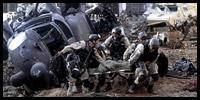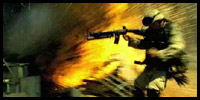
 |
Black Hawk Down (2001) Directed by Ridley Scott Cast: Josh Hartnett, Tom Sizemore, Sam Shepard, Ewan McGregor, Eric Bana, William Fichtner, Ewen Bremner, Orlando Bloom, Ron Eldard, Jeremy Piven, Kim Coates, Gabriel Casseus, Hugh Dancy, Ioan Gruffudd, Tom Guiry, Charlie Hofheimer, Danny Hoch, Jason Isaacs, Zeljko Ivanek, Brendan Sexton III, Glenn Morshower, Johnny Strong, Richard Tyson, Brian Van Holt, Steven Ford, Nikolaj Coster-Waldau, Matthew Marsden, Michael Roof, Enrique Murciano, Kent Linville. 2001 – 144 minutes Rated: Reviewed by Dustin Putman, January 18, 2002.  "Black Hawk Down," directed by Ridley Scott (2001's "Hannibal"), is about as far removed in style and objective from 2001's "Pearl Harbor" as two war movies could possibly be. Both were produced by action megalomaniac Jerry Bruckheimer, but that is where the similarities end. Whereas "Pearl Harbor" presented a glossy, character-based look at a tragic moment in history, director Scott and screenwriters Steve Zaillian (1998's "A Civil Action") and Ken Nolan have made "Black Hawk Down" a stark, gritty motion picture that is more interested in the details of the story than character-developing. Taking such an approach makes for a visceral, stirring film experience, but one that stands emotionally at arm's length from the viewer.
"Black Hawk Down," directed by Ridley Scott (2001's "Hannibal"), is about as far removed in style and objective from 2001's "Pearl Harbor" as two war movies could possibly be. Both were produced by action megalomaniac Jerry Bruckheimer, but that is where the similarities end. Whereas "Pearl Harbor" presented a glossy, character-based look at a tragic moment in history, director Scott and screenwriters Steve Zaillian (1998's "A Civil Action") and Ken Nolan have made "Black Hawk Down" a stark, gritty motion picture that is more interested in the details of the story than character-developing. Taking such an approach makes for a visceral, stirring film experience, but one that stands emotionally at arm's length from the viewer.
 Primarily set over a 24-hour period in October 1993, "Black Hawk Down" tells of a routine U.S. military raid in search of a warlord in the starving city of Mogadishu, Somalia, that went terribly wrong when they were met with violent resistance. When all was through, two helicopters had been shot down, 18 soldiers (Army Rangers and Delta Force) were killed, and 70 more were wounded. Taking an almost hour-by-hour look at this little-known tragedy (which led to President Bill Clinton's prematurely pulling the troops from the humanitarian mission), it is expertly shown what, how, and why the mission went so wrong.
Primarily set over a 24-hour period in October 1993, "Black Hawk Down" tells of a routine U.S. military raid in search of a warlord in the starving city of Mogadishu, Somalia, that went terribly wrong when they were met with violent resistance. When all was through, two helicopters had been shot down, 18 soldiers (Army Rangers and Delta Force) were killed, and 70 more were wounded. Taking an almost hour-by-hour look at this little-known tragedy (which led to President Bill Clinton's prematurely pulling the troops from the humanitarian mission), it is expertly shown what, how, and why the mission went so wrong.
 As an exercise in presenting a gruesome, awful segment in our recent war history, "Black Hawk Down" is both startling and absorbing. After a brief 30-to-40-minute setup, the audience is dropped into the unrelenting line of fire for the next two hours. Limbs fly, blood splatters, and many of the soldiers and Somalian civilians find their lives taken from them. Scott, accompanied by the swirling, "you-are-there" cinematography from Slavomir Idziak (2000's "Proof of Life"), depict the events that occurred on that fateful day in Somalia with an eye for specificity and a courageousness that does not sugarcoat the gory violence.
As an exercise in presenting a gruesome, awful segment in our recent war history, "Black Hawk Down" is both startling and absorbing. After a brief 30-to-40-minute setup, the audience is dropped into the unrelenting line of fire for the next two hours. Limbs fly, blood splatters, and many of the soldiers and Somalian civilians find their lives taken from them. Scott, accompanied by the swirling, "you-are-there" cinematography from Slavomir Idziak (2000's "Proof of Life"), depict the events that occurred on that fateful day in Somalia with an eye for specificity and a courageousness that does not sugarcoat the gory violence.
 The cast list is remarkable, reading like a who's who of the talented male actors working in film today. The characters have intentionally not been mentioned, however, because they fall into one of two categories: those that have been cursorily developed to only the barest essentials, and those that are little more than faces in the crowd. Aside from Josh Hartnett (2001's "Pearl Harbor"), as frightened, yet strong-willed Sergeant Eversmann; Orlando Bloom (2001's "The Lord of the Rings: The Fellowship of the Rings"), as the young, inexperienced Private 1st Class Todd Blackburn; Tom Sizemore (2000's "Red Planet"), as Lt. Colonel Danny McKnight; and Ewan McGregor (2001's "Moulin Rouge"), as Company Clerk John Grimes, the rest of the characters are nearly interchangeable or, at the most, not emphasized enough to really matter.
The cast list is remarkable, reading like a who's who of the talented male actors working in film today. The characters have intentionally not been mentioned, however, because they fall into one of two categories: those that have been cursorily developed to only the barest essentials, and those that are little more than faces in the crowd. Aside from Josh Hartnett (2001's "Pearl Harbor"), as frightened, yet strong-willed Sergeant Eversmann; Orlando Bloom (2001's "The Lord of the Rings: The Fellowship of the Rings"), as the young, inexperienced Private 1st Class Todd Blackburn; Tom Sizemore (2000's "Red Planet"), as Lt. Colonel Danny McKnight; and Ewan McGregor (2001's "Moulin Rouge"), as Company Clerk John Grimes, the rest of the characters are nearly interchangeable or, at the most, not emphasized enough to really matter.
Even with Hartnett, who is top-billed, the viewer is never told exactly who he is, where he has come from, and what makes him tick, save for the minute information that comes out of his actions onscreen. Other young actors I admire, such as Brendan Sexton III (1999's "Boys Don't Cry"), Tom Guiry (2000's "U-571"), and Charlie Hofheimer (1996's "Boys"), appear in the main credits but make so little impression that I cannot recall seeing any of them in the film, or didn't recognize them.  As a play-by-play account of a war-set battle, "Black Hawk Down" is exceptional storytelling with a craftsmanship that is truly stunning. But as a movie that wants to enter into deep, metaphysical territory, it comes up far short to Terrence Malick's 1998 masterpiece, "The Thin Red Line." Absent in "Black Hawk Down" is the emotional weight required for the picture to have the amount of substance equal to its style, and it does not help that the human figures remain enigmas for the duration of the 144 minutes.
As a play-by-play account of a war-set battle, "Black Hawk Down" is exceptional storytelling with a craftsmanship that is truly stunning. But as a movie that wants to enter into deep, metaphysical territory, it comes up far short to Terrence Malick's 1998 masterpiece, "The Thin Red Line." Absent in "Black Hawk Down" is the emotional weight required for the picture to have the amount of substance equal to its style, and it does not help that the human figures remain enigmas for the duration of the 144 minutes.
Late in the film, Hartnett says that soldiers do not purposefully set out to be heroes, but that it sometimes ends up that way. Such a statement is deeply affecting and truthful, and more or less serves as a description to what "Black Hawk Down" is really all about. It is too bad, then, that there is nothing in the opening 130 minutes that is nearly as insightful. ©2002 by Dustin Putman |
 |













